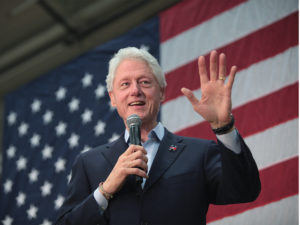
20 years ago, starting Jan. 9, 1999, and continuing until the beginning of February, the second ever Senate trial of a president of the United States was held, starring former President Bill Clinton. His trial was the culmination of an investigation led by special prosecutor Kenneth Starr. Clinton was initially investigated over suspicious dealings in the Whitewater Property sale in Arkansas, which led to a domino effect of other investigations involving TravelGate, FileGate and ending with a civil suit involving a sexual harassment claim by Paula Jones.
Two things were made very clear from the conclusion of the investigations. One, the President had lied in his deposition to investigators, thus committing perjury about sexual relations with former White House staffer Monica Lewinsky, and secondly, he had also attempted to obstruct justice by instructing aides to refuse their compliance with a subpoena. Later, Bill Clinton was acquitted of those charges, due to a very partisan vote in the U.S. Senate: nearly all Republicans voted to convict the president, and nearly all Democrats did the opposite, resulting in only a 55-45 margin for the perjury charge and 50-50 for the obstruction charges. As a result of the failure to convict the president, the consequences are still felt in our present-day politics. The outcome of the trial ultimately had two major impacts: the bar was subsequently raised for an impeachment to ever proceed in the future, and the moral fabric of the country withered, leading us to the present day situation we find ourselves in.
To this day, President Donald Trump has been accused of the following: paying off a porn star with campaign money, being accused multiple times by multiple different women for sexual crimes, the investigation for possible ties to Russia as well as possible obstruction charges with his personal attorney, Michael Cohen. In every single one of these cases, the standard has been lowered in terms of the call for impeachment. Rather than entertain the possibility of crimes being committed, the entire mountain of accusations has become something of a pointless charade. Right wing commentators have a tendency to claim that because of Bill Clinton, the political standard for an impeachment has changed. As a result, oversight has become much more prominent in the post-Clinton world, where basic intellectual honesty from the party identifying with the current president would never be done, all dating back to this incident.
The other reason why Bill Clinton’s trial proceeding broke the country and polarized us further was because of the negative impact this trial had on the moral character of the country, specifically in the context of assessing the Monica Lewinsky scandal. Nowadays, when relitigating this case, people might speculate that despite this relationship being consensual, it still was not right because of the prominent power imbalance between the president and his intern. However, at the time, the ones who saw an issue with the relationship and expressed it were firmly in the minority. In fact, as the proceedings dragged on and the the trial progressed, the opposite of what was expected had occurred: his approval rating soared, and the media viciously attacked Lewinsky in contrast to some of the reporting done today on Stormy Daniels and others who accused this president of sexual impropriety.
The issue is that now, because of the blatant dishonesty that came from Clinton’s impeachment proceedings and given the fact that few to no Democrats were willing to convict the president over well-documented evidence, the country may never agree on what is right, or wrong, in a moral failure like this. Unwittingly, the Democrats, the media and the American people did wrong and left us with a false double standard by refusing to convict 20 years ago.
In summation, the failure to convict Bill Clinton for the crimes he commited has now left the country frayed. If the Mueller report reaches a damning point, or if the Democratic House ever moves to impeach this president, they will meet stiff opposition from a loud and vocal majority. The Clinton case has set a troubling precedent of partisanship that could impede efforts at carrying out justice properly.








